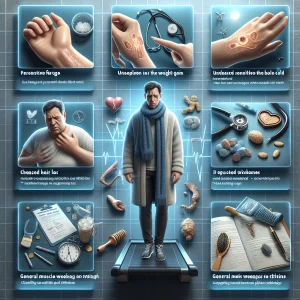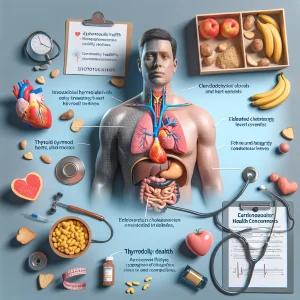Comprehensive Insights into the Health Implications of Hypothyroidism for Men
Hypothyroidism in men is a significant health issue marked by the inadequate production of essential thyroid hormones by the thyroid gland, located at the front of the neck. These hormones, specifically thyroxine (T4) and triiodothyronine (T3), play a vital role in regulating various bodily functions, including metabolism, energy levels, and general vitality. While this condition can impact anyone, men often face unique symptoms and challenges that can severely affect their quality of life. Understanding hypothyroidism's intricacies is crucial for effective management and treatment, empowering men to take charge of their health and well-being.
Recognizing the distinctive traits associated with hypothyroidism is essential for implementing effective treatment and management strategies. Often, men may dismiss the signs of this condition due to their subtlety, mistakenly attributing them to stress, lifestyle changes, or the aging process. This misperception can lead to ongoing discomfort, worsening health complications, and a significant decline in overall well-being if not promptly addressed. Therefore, early detection is key to achieving optimal health outcomes and maintaining a fulfilling quality of life.
The origins of hypothyroidism can be diverse, encompassing autoimmune disorders like Hashimoto’s thyroiditis, side effects of certain medications, or complications arising from radiation therapy. Being able to recognize and understand the symptoms early is critical for timely intervention, which can significantly enhance one’s health and improve overall well-being.
Key Facts About Hypothyroidism That Every Man Must Know
- Hypothyroidism in men indicates insufficient thyroid hormone production by the thyroid gland, leading to various physical and psychological health issues.
- Physical symptoms may encompass chronic fatigue, unexpected weight gain, thinning hair, and muscle weakness. Moreover, health risks include elevated cholesterol levels, a higher likelihood of heart disease, and potential diabetes onset.
- The emotional effects of hypothyroidism in men can manifest as depression, anxiety, and cognitive challenges, severely impacting overall life quality.
- This condition can adversely affect sexual health, resulting in reduced libido, erectile dysfunction, and possible fertility issues.
- Men with hypothyroidism often find weight management difficult, as the condition slows metabolic rates, complicating weight loss efforts and necessitating tailored dietary and exercise regimens.
 Recognizing the Physical Indicators and Health Risks Linked to Hypothyroidism
Recognizing the Physical Indicators and Health Risks Linked to Hypothyroidism
The physical symptoms associated with hypothyroidism can vary significantly from person to person. Commonly, men with this condition report chronic fatigue, unanticipated weight gain, increased sensitivity to cold, and generalized muscle weakness. You might find yourself feeling exhausted even after a full night’s sleep or struggling to lose weight despite following a healthy diet and staying active.
These distressing symptoms can lead to self-doubt regarding your lifestyle choices and fitness routines. Additionally, hypothyroidism may manifest in less obvious ways, such as noticeable alterations in skin texture, including dryness or pallor, and an increase in hair loss or thinning. Addressing these symptoms promptly is crucial for effective management and improving your overall health.
A slower heart rate may also develop, contributing to feelings of lethargy and diminished stamina during physical activities. The cumulative impact of these physical symptoms can significantly interfere with daily activities and overall functionality. Consequently, seeking medical advice is vital if you suspect hypothyroidism may be affecting your health.
Exploring the Mental and Emotional Challenges Linked to Hypothyroidism
The mental and emotional impacts of hypothyroidism are often underestimated yet deserve significant consideration. As thyroid hormone levels decline, you may notice mood swings, increased feelings of depression, or heightened anxiety. Such emotional fluctuations can lead to irritability and exhaustion, straining personal relationships and diminishing overall life satisfaction.
Research highlights the complex relationship between thyroid function and mental health, emphasizing the importance of recognizing this connection for effective management. Cognitive abilities may also decline due to hypothyroidism, leading to experiences often referred to as “brain fog.” You might struggle with concentration, forget small tasks, or feel mentally fatigued, especially in fast-paced environments where clarity and focus are paramount.
It is essential to acknowledge these cognitive and emotional symptoms as significant aspects of hypothyroidism, advocating for appropriate medical intervention. For further information about the relationship between hypothyroidism and mental health, consider exploring the Mayo Clinic website for comprehensive insights.
 Understanding the Profound Effects of Hypothyroidism on Men’s Sexual Health
Understanding the Profound Effects of Hypothyroidism on Men’s Sexual Health
Hypothyroidism can significantly impact sexual health in men, leading to various complications. Diminished levels of thyroid hormones can result in decreased libido, erectile dysfunction, and even infertility. You may notice a marked decrease in your interest in sexual activity or encounter challenges in achieving or maintaining an erection.
These sexual health challenges can be distressing, causing feelings of inadequacy, frustration, and anxiety within intimate relationships. The hormonal imbalances linked to hypothyroidism can also disrupt testosterone levels, complicating the already intricate dynamics of sexual health. Low testosterone may lead to increased fatigue, mood fluctuations, and decreased sexual desire, creating a challenging cycle that can be tough to break.
Discussing these sexual health concerns with your healthcare provider is crucial to exploring effective treatment options aimed at restoring both thyroid function and sexual health, ensuring a comprehensive approach to your overall well-being.
Strategies for Successfully Managing Weight Challenges Associated with Hypothyroidism
Weight management often proves exceptionally challenging for men diagnosed with hypothyroidism. The slowed metabolism typically accompanying low thyroid hormone levels can impede your ability to lose or maintain a healthy weight. Even with consistent exercise and a balanced diet, you may find that shedding those extra pounds feels like an uphill struggle.
This ongoing battle can be disheartening, leading to feelings of frustration or hopelessness regarding weight management. Recognizing the link between hypothyroidism and weight gain is essential for developing effective strategies. Collaborating with a healthcare provider can help create a personalized plan that addresses both thyroid health and weight management objectives.
This partnership may involve adjusting medications, modifying dietary habits, and implementing specific exercise routines designed to enhance metabolism while considering your energy levels. Taking control of your health through informed decisions can lead to positive outcomes.
 Evaluating the Connection Between Hypothyroidism and Cardiovascular Health Risks
Evaluating the Connection Between Hypothyroidism and Cardiovascular Health Risks
The connection between hypothyroidism and cardiovascular health is a major concern for men diagnosed with this condition. Inadequate thyroid hormone levels can elevate cholesterol levels, increasing the risk of heart disease over time. It is essential to understand that the fatigue and lethargy frequently associated with hypothyroidism may not only be symptoms of the condition but could also indicate underlying cardiovascular issues requiring attention.
Regular cardiovascular assessments are crucial for individuals with hypothyroidism. Your healthcare provider may suggest lifestyle modifications, such as adopting a heart-healthy diet rich in fruits, vegetables, whole grains, and lean proteins. Additionally, engaging in regular physical activity that aligns with your energy levels can promote thyroid function while enhancing cardiovascular health. By proactively managing your thyroid health and cardiovascular fitness, you can substantially reduce the risk of further complications.
Exploring the Effects of Hypothyroidism on Male Fertility
Fertility challenges represent another significant aspect associated with hypothyroidism in men. Low thyroid hormone levels can disrupt the delicate hormonal balance essential for sperm production and overall reproductive health. If you are struggling to conceive, it is vital to consider how your thyroid function may be impacting your fertility journey.
Effectively managing hypothyroidism through appropriate treatment can not only enhance overall health but also improve the chances of successful conception. Collaborating with a knowledgeable healthcare provider who understands the complex relationship between thyroid function and fertility is crucial to developing a comprehensive strategy that addresses both areas. This may include regular monitoring of hormone levels through blood tests and adjusting medications to optimize reproductive health.
Holistic Approaches for Managing and Treating Hypothyroidism in Men
Effectively managing hypothyroidism requires a comprehensive approach that includes regular monitoring through blood tests, medication management, lifestyle adjustments, and open communication with healthcare professionals. Blood tests are essential for diagnosing hypothyroidism, as they evaluate critical indicators such as Thyroid-Stimulating Hormone (TSH) and T4 levels. Elevated TSH levels often indicate an underactive thyroid, while low T4 levels confirm the diagnosis.
After diagnosis, treatment typically involves hormone replacement therapy with synthetic thyroid hormones like levothyroxine. This medication helps restore normal hormone levels, alleviating many symptoms associated with hypothyroidism. Regular follow-up appointments are vital for assessing treatment effectiveness and making necessary adjustments based on blood test outcomes.
In addition to medication, lifestyle changes—such as adopting a nutrient-dense diet that supports thyroid health, rich in iodine, selenium, and zinc—can be highly beneficial. Engaging in regular physical activity that aligns with your energy levels can also aid in managing symptoms while enhancing overall well-being. By actively participating in your health management through education, collaboration with healthcare providers, and lifestyle modifications, you can lead a fulfilling life despite the challenges posed by hypothyroidism.
Common Questions About Hypothyroidism in Men
What does hypothyroidism in men involve?
Hypothyroidism in men is characterized by a condition where the thyroid gland fails to produce adequate thyroid hormones, resulting in a metabolic slowdown and various health complications.
What symptoms are commonly experienced with hypothyroidism in men?
Common symptoms of hypothyroidism in men include fatigue, weight gain, sensitivity to cold, dry skin, constipation, muscle weakness, and feelings of depression.
How is hypothyroidism diagnosed in men?
The diagnosis of hypothyroidism in men is established through blood tests that measure levels of thyroid-stimulating hormone (TSH) and thyroxine (T4) in the bloodstream.
What factors contribute to hypothyroidism in men?
The primary cause of hypothyroidism in men is often an autoimmune disorder known as Hashimoto’s thyroiditis. Other contributing factors may include thyroid surgery, radiation treatment, and certain medications.
What treatment options are available for men suffering from hypothyroidism?
Men diagnosed with hypothyroidism typically receive treatment through synthetic thyroid hormone medications, such as levothyroxine, to replace deficient hormones and restore normal thyroid function.
Can hypothyroidism lead to additional health complications in men?
If untreated, hypothyroidism in men can result in complications such as heart disease, fertility challenges, and mental health issues. Seeking appropriate treatment is crucial to mitigate these risks.
This Content Is Sponsored By: Thyroid Testing UK
Hypothyroidism in Men: The Impact On Health Was First Published By https://bloodtest.co.uk
Find Us On Facebook: EZ Blood Tests
The Article: Hypothyroidism in Men: Health Implications Explored appeared first on: https://ezbloodtest.com
The Article Hypothyroidism in Men: Exploring Health Implications Was Found On https://limitsofstrategy.com

This is such a vital topic, and I find it particularly interesting how often the signs of hypothyroidism are overlooked in men. I’ve seen firsthand how subtle symptoms like fatigue and weight gain can creep in unnoticed, and it really can be attributed to a myriad of causes—not just the thyroid. It makes me think about how important it is for men to not only be aware of their symptoms but also to openly talk about them without stigma, which can be a barrier to seeking help.